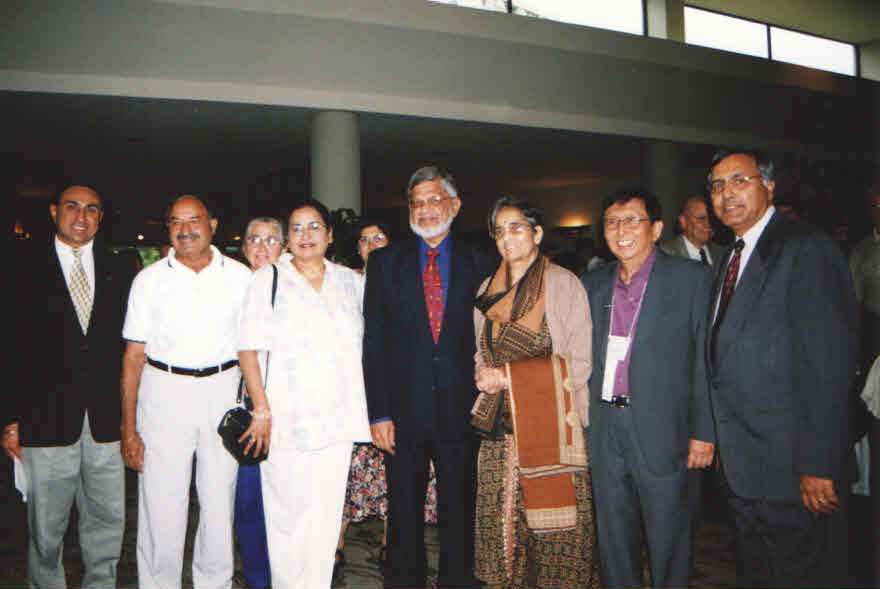I am pleased to announce that The 8th Biennial International Meaning Conference will be held in Vancouver, Canada, July 24-27, 2014. This year, the International Network on Personal Meaning (INPM) will join forces with the Constructivist Psychology Network (CPN) to form the First Congress on the Construction of Personal Meaning. More importantly, INPM’s Meaning Conference will focus on international and cross-cultural issues of personal meaning.
I want to take this opportunity to share my vision for International Psychology through a brief history of the INPM and its Biennial Meaning Conferences. This will give my colleagues a glimpse of one man’s adventure or misadventure to create a forum for International Psychology.
Back in 1998, when I was the Director of the Graduate Counselling Program at Trinity Western University, I founded the INPM to advance the mission of Viktor Frankl in a way that is broader than his classic Logotherapy (Frankl, 1985). Frankl’s main focus was to help people become conscious of their personal responsibility to fulfill their unique life tasks of serving others and discover the meaning in seemingly meaningless situations (e.g., suffering and terminal illness). It is through the seeking and construction of meaning that one finds significance, fulfillment, and vitality in a chaotic and turbulent world.
I found Frankl’s vision to be both moving and compelling, particularly his uplifting message to the suffering masses that they can still live with meaning and dignity in the face of adversity and death. Frankl has provided the missing pieces lacking in contemporary positive psychology, which focuses on the well-being of people in neutral and positive territories. As a result, I have developed existential positive psychology (Wong, 2009, 2014) to integrate logotherapy and positive psychology.
While maintaining the basic tenets of Logotherapy, I have reached out to meaning researchers and practitioners from different countries with different theoretical stripes in order to develop a truly broadly based, universally applicable roadmap for meaning-seekers around the world. We are pleased that Vienna’s Viktor Frankl Institut recognized INPM from the from the very beginning and now has formally recognized the INPM as an Accredited Member Institute of the International Association of Logotherapy and Existential Analysis at the Viktor Frankl Institute Vienna.
Here is a more detailed version of its mission statement:
“INPM is dedicated to advancing health, spirituality, peace and human fulfillment through research, education and applied psychology with a focus on the universal human quest for meaning and purpose. We accomplish this mission through research, publications, conferences, and public education.”
Another significant extension of logotherapy is our attempts to incorporate culture in meaning research and therapy (Wong, 2011). As indicated in this mission statement, INPM focuses on the universal human needs for spirituality and meaning as pathways towards a better world of harmony, peace, and fulfillment. We have adopted the strategy of organizing International Meaning Conferences as an inclusive “big tent” for people from different countries and different theoretical camps.
The first International Meaning Conference was held in Vancouver in July 2000, with Irvin Yalom, Ernesto Spinelli, C. R. Snyder, and David Myers as keynote speakers. The main theme of the conference was “Searching for Meaning in the New Millennium.” I intentionally invited leaders from existential and positive psychology camps to speak at the same conference to address the fundamental needs of human beings for meaning and happiness. My vision was that the Conference would serve as a springboard for a meaning-based global positive revolution in the new millennium (Wong, 2008).

Figure 1. Meaning Conference 2002. Middle: Arun Gandhi. Far right: Ujjal Dosanjh, former premier of BC
The international and cross-cultural emphasis became clearer at our second conference, also held in Vancouver, in July 2002. The theme of this conference was “Freedom, Responsibility and Justice.” The most memorable event of that conference was that we were able to have Arun Gandhi, grandson of Mahatma Gandhi and Director of the Gandhi Institute for Non-Violence, as one of the keynote speakers. He was able to draw a few hundred from the Canadian South Asian community to hear his keynote address.
On average, we have had over 300 attendees from more than 30 countries at our Meaning Conferences. Looking back, sometimes I felt my efforts to create an international psychology forum where all voices are heard and a thousand flowers bloom is more like the adventure of Don Quixote tilting at windmills. It was difficult and costly to bring in psychology leaders from different countries, but it was even more difficult to get leaders from different theoretical camps to dialogue with each other
However, I am encouraged by the strong interest among the younger researchers and graduate students in developing a more global and integrative perspective. I am also encouraged that personal friendships were formed among attendees from different countries. We have also published two volumes of conference proceedings, The Positive Psychology of Meaning and Spirituality (2012) and The Positive Psychology of Meaning and Addiction Recovery (2013). The third volume will focus on international and cultural issues in the research and applications of meaning.
After more than 10 years, I have not given up my vision in spite of the challenges. Neither the colonizing of American psychology, nor the indigenous movement serves as a promising model of international psychology. A third alternative, as demonstrated in INPM’s mission and Meaning Conferences, is to bring psychology leaders together to integrate theoretical and methodological issues on existential topics that have a universal appeal, such as: How can we be fully functioning human beings? What makes life worth living?
Now we are ready for our 8th Biennial Meaning Conference, with a special focus on international and cross-cultural dimensions of meaning in life. This Conference represents my latest efforts to bring together psychology leaders from different countries to address various aspects of meaningfulness, such as:
- What makes life worth living regardless of circumstances?
- How does meaning contribute to healing and flourishing?
- What kinds of goals or values contribute to meaningfulness and why?
- What is the role of culture in shaping one’s concept of meaningfulness?
- What are the international and cultural differences in well-being and meaning?
- Is meaning subjective, objective, or a mixture of both?
- How can we build a science of meaning beyond self-report measures?
- Do we need ultimate meaning that transcends the self and its limitations?
- How could a secular meaning system give us a sense of ultimate meaning?
In the midst of global trends of secular materialism and sectarian religious fundamentalism, existential positive psychology, as introduced here, may offer a more promising alternative for better world. I do hope that some members of Division 52 will share my vision and partner with me in advancing a truly international and cross-cultural existential positive psychology of meaning and well-being. I look forward to seeing many of my international friends at the conference. For those who are interested in participating, please visit www.meaning.ca/conference/ or write to me directly at drpaulwong@gmail.com.
References
- Frankl, V. E. (1985). Man’s search for meaning (Revised & updated ed.). New York, NY: Washington Square Press.
- Wong, L. C. J., Thompson, G. R., & Wong, P. T. P. (Eds.) (2013). The positive psychology of meaning and addiction recovery: Selected papers from Meaning Conferences. Birmingham, AL: Purpose Research.
- Wong, P. T. P. (2007). Introduction: A quiet positive revolution. In P. T. P. Wong, L. C. J. Wong, M. J. McDonald, & D. W. Klaassen (Eds.), The positive psychology of meaning and spirituality: Selected papers from meaning conferences (pp. 1-8). Abbotsford, BC: INPM Press.
- Wong, P. T. P. (2009). Existential positive psychology. In S. J. Lopez (Ed.), Encyclopedia of positive psychology (Vol. 1, pp. 361-368). Oxford, UK: Wiley Blackwell.
- Wong, P. T. P. (2011). Meaning-centered counseling and therapy: An integrative and comprehensive approach to motivational counseling and addiction treatment. In W. M. Cox, & E. Klinger (Eds.), Handbook of motivational counseling: Goal-based approaches to assessment and intervention with addiction and other problems (pp. 461-487). West Sussex, UK: Wiley.
- Wong, P. T. P. (2014). Viktor Frankl’s meaning seeking model and positive psychology. In A. Batthyany & P. Russo-Netzer (Eds.), Meaning in existential and positive psychology (pp. 149-184). New York, NY: Springer.
- Wong, P. T. P., Wong, L. C. J., McDonald, M. J., & Klaassen, D. W. (Eds.). (2012). The positive psychology of meaning and spirituality: Selected papers from Meaning Conferences. Birmingham, AL: Purpose Research. (Original published in 2007 by INPM Press)
Cite
Wong, P. T. P. (2014, March 31). My vision for international psychology and the Meaning Conference. Dr. Paul T. P. Wong. Retrieved from http://www.drpaulwong.com/my-vision-for-international-psychology-and-the-meaning-conference/

 Meaning Conference 2025 will be the INPM’s first in-person conference with a virtual option after the pandemic.
Meaning Conference 2025 will be the INPM’s first in-person conference with a virtual option after the pandemic.